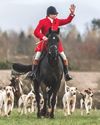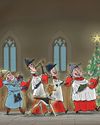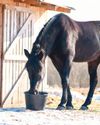
INFECTION by the bacterium Borrelia burgdorferi, which causes Lyme disease, is becoming more recognisable and more common in regions in which types of ticks (Ixodes spp.), which carry the bacterium, are endemic.
Lyme disease is referred to as a vector-borne disease, because the spread of the bacteria relies on the tick (the vector) to transmit the disease to various host animals when it feeds. It is thought to be the most common disease spread by ticks in the northern hemisphere and commonly occurs in the spring and early summer.
Within the UK, research in horses has observed high levels of seropositivity (presence of the antibodies that combat the disease) in East Anglia and on the south coast, but low seropositivity in Newmarket, Yorkshire, Scotland and Ireland.
Similar trends have been seen in human medicine and in dogs. Not all horses with antibodies develop signs, and those clinical signs that are evident are often described by owners as vague and mysterious.
THE TICK’S LIFE CYCLE
IT is important to understand the tick’s life cycle in order to take measures to reduce the risk of your horse contracting the disease.
Ticks need to have a new host at each stage of their life.
In spring, female ticks detach from hosts and lay thousands of eggs in warm spots on the ground. With the arrival of summer, the eggs hatch and produce six-legged larvae. The larvae may be infected with B. burgdorferi but more commonly, ticks become infectious once they have absorbed the pathogen from one of their hosts.
This story is from the August 10, 2023 edition of Horse & Hound.
Start your 7-day Magzter GOLD free trial to access thousands of curated premium stories, and 9,000+ magazines and newspapers.
Already a subscriber ? Sign In
This story is from the August 10, 2023 edition of Horse & Hound.
Start your 7-day Magzter GOLD free trial to access thousands of curated premium stories, and 9,000+ magazines and newspapers.
Already a subscriber? Sign In

'He's a terrier - a very classy terrier'
Jonbon emulates some legendary chasers as a dual Tingle Creek victor, and trainer Dan Skelton scores a seasonal century

Rupert
This beautiful master's horse hates quad bikes and is \"scared of his rug\" but is dearly loved by both Nigel Peel and his son Jamie

London's landmark moments
What makes London so special for dressage fans? Oscar Williams delves into its unique history, speaking to experts about their most treasured memories and the show's remarkable evolution in the sport

Golden oldies take centre stage
The finals at London International are among the most regarded championships on the senior showing circuit. Alex Robinson investigates the finals and what's contributed to their popularity

Winter wrapped up
With the long-range weather forecast suggesting a chilly winter ahead, how can equestrians prepare for the challenges of frost, ice and snow? Stephanie Bateman finds out

Party time
From Whitaker vs Whitaker football matches to a hunting choir roaring carols, top riders know how to let their hair down at Christmastime. Netia Walker unearths the best festive parties

Rocking their world
Rocking horses were once a common fixture in children's playrooms - or a charming trinket on a Christmas tree. Now, some are getting a new lease of life for grown-up enthusiasts, finds Liz Falkingham

Winter watering
Maintaining a horse's water intake is crucial, but can be tricky in the colder months. Karen Coumbe MRCVS explains why, and how to help

Shetland Pony Grand National organiser
Sebastian Garner on whittling down applicants, playing headmaster and the joy of watching Shetlands at full lick

Peder Fredricson
The Swedish flagbearer and four-time Olympic medallist tells Jennifer Donald about 2024's ups and downs, the key to social licence and silver linings